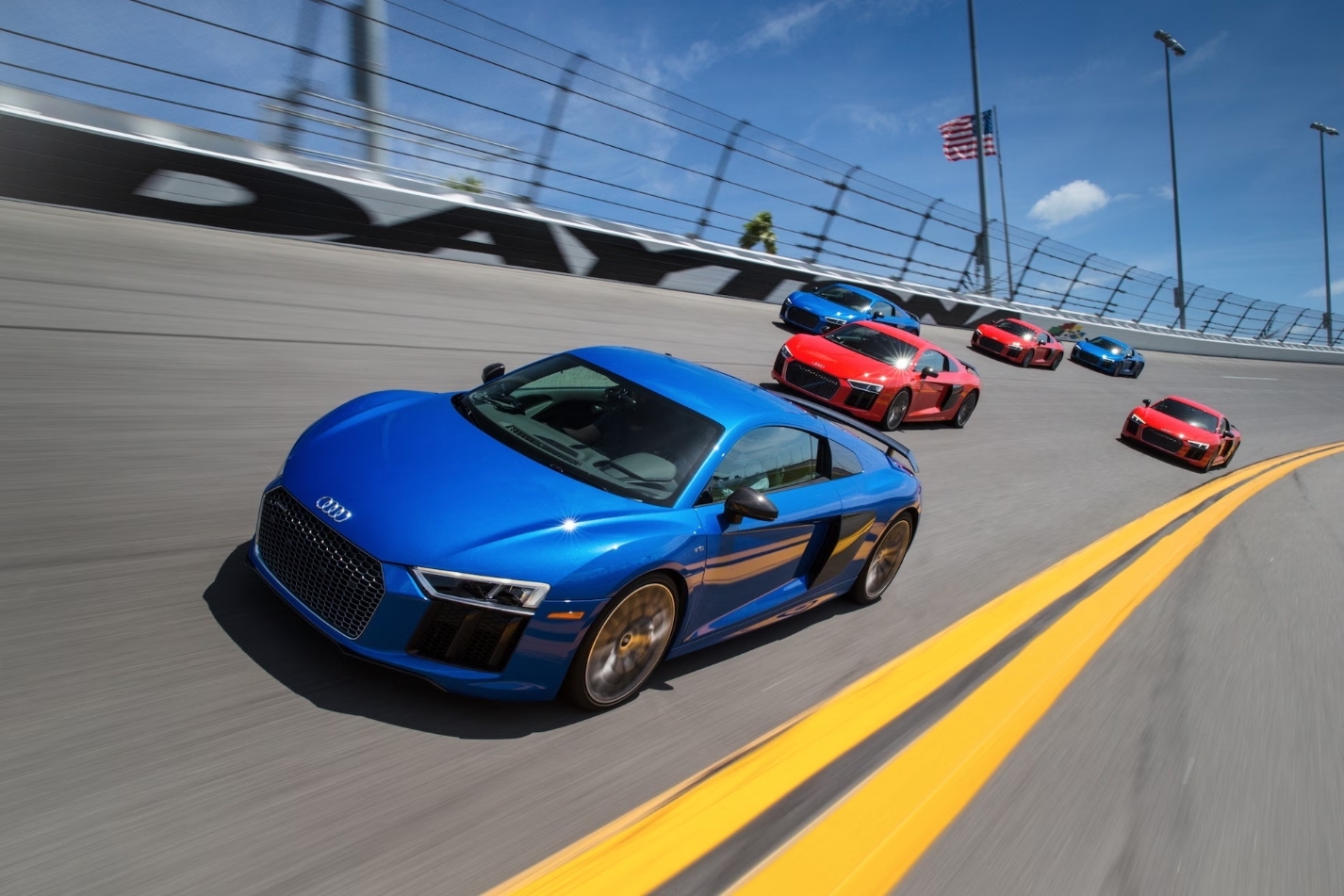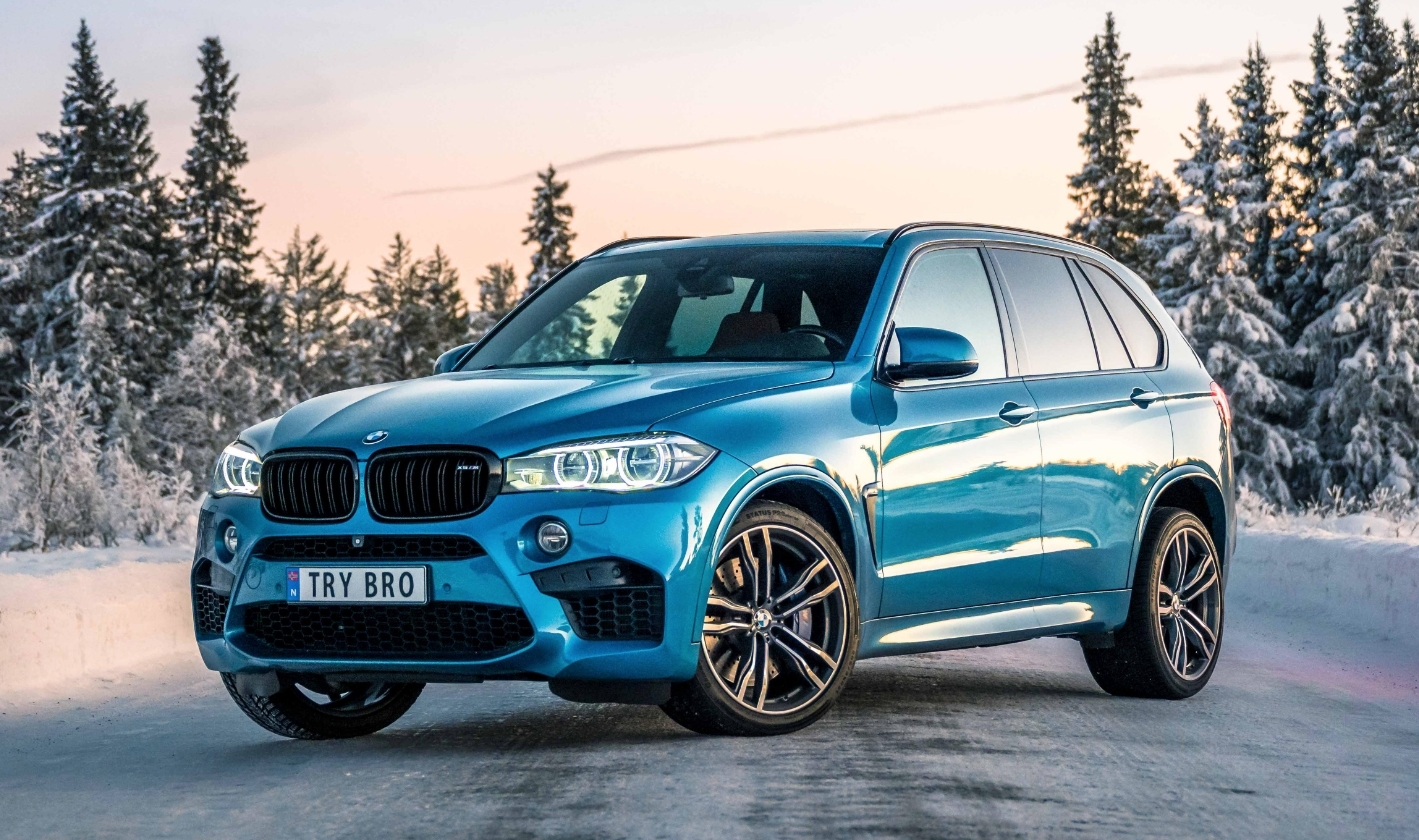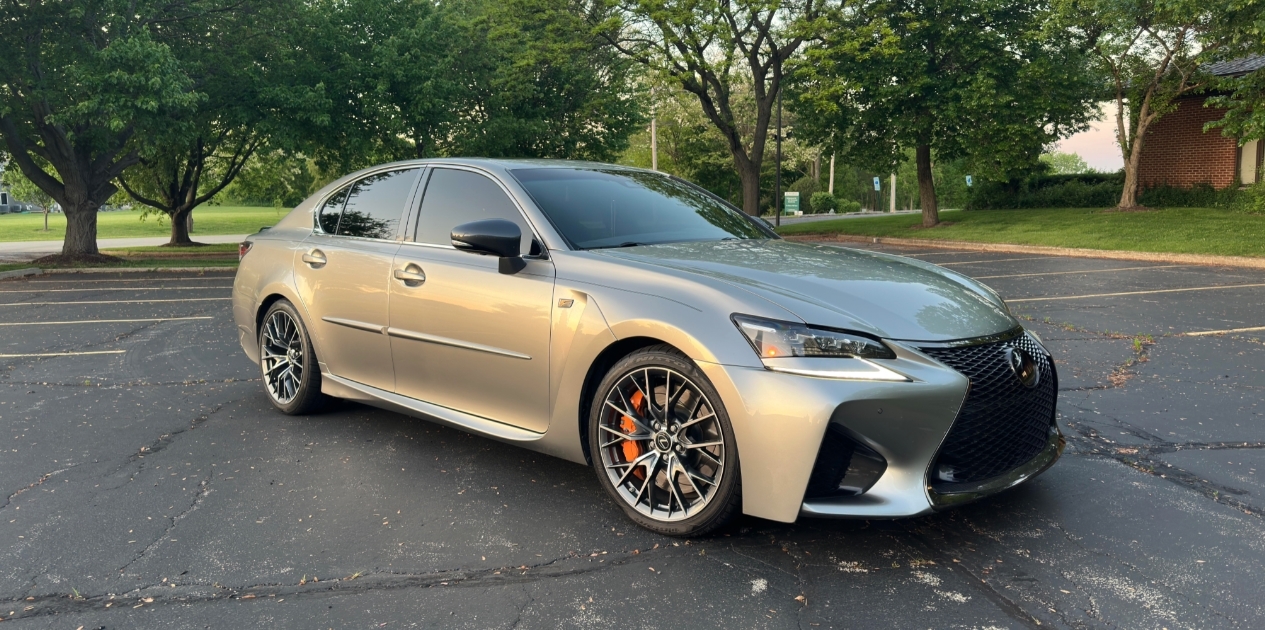The introduction of the 2nd generation Audi R8 V10 arrived in 2017. It marked a new era for Audi’s halo car, replacing the much-loved original that has been around since 2008. The task of creating a new R8 was daunting for Audi, given the outstanding success of the first generation.
Many of its features are shared with the Lamborghini Huracan, these feature the 5.2L V10 engine, AWD system, and carbon-and-aluminum structure.
Photo by Motor Trend
Although the 2nd generation R8 has a more angular and aggressive design, it has departed from the original R8’s iconic side blade. While it is more aggressive and has a more angular design, the shape, and silhouette are still unmistakable as an R8.
The interior of the R8 has been designed to prioritize new technologies, comfort, and performance.
Photo by Top Gear
With its advanced technology and ergonomic design, the new R8 has become a supercar that is not only usable for high-performance track experiences, but also for everyday driving.
Slotting it between the McLaren 570s, Mercedes-Benz AMG GT, Acura NSX, and Porsche 911 Turbo, the R8 has cemented its place as one of the most formidable sports cars in its class.
Photo by Marino Performance Motors
Like the original, it remains intensely close to the Italian car. The Huracán is aggressive and sharp, while the R8 is graceful and sophisticated.
One standout feature that sets the R8 apart from its competitors is its screaming V10 engine, which produces a sound that is unmatched in comparison.
The R8 driving experience provides an even more dynamic than the original it replaced. Most notably the improved Quattro awd system and increased horsepower.
Photo by Audi
It no longer comes in manual transmission and doesn’t utilize the sluggish R Tronic transmission, which was something enthusiasts avoided and has now been upgraded to feature a fantastic 7-speed DCT that delivers seamless shifting.
Press the red button on the steering wheel, and you’ll instantly be greeted with the roar of the V10 engine.
Also new for the R8 is Audi Drive Select. Pressing the Drive Select button on the steering wheel offers the driver several driving modes:
The available driving modes in the R8 modify the behavior of the drivetrain for a more tailored driving experience.
In Dynamic mode, the transmission switches into S, rev matching is enabled, and the gears are held longer into the red line, while the bias of the Quattro system is also adjusted.
The Performance button, on the other hand, allows drivers to adjust the level of traction control based on their preferences.
Additionally, a rotary knob is provided around the Performance button to select the dry, wet, and snow traction programs for even more control in different driving conditions.
While the original R8 has rightfully earned its place in automotive history, the 2nd generation is no slouch.
Driving an R8 is sure to turn heads and an experience itself, as there are fewer and fewer cars on the road these days with a V10 engine.
Model Changes (Breakdown by Year)
The 2017 model is the first full year of production for the 2nd generation R8, which replaced the original R8 from 2008 to 2015.
The base price for the R8 V10 was ($165,000), R8 V10 Plus was ($192,000) and R8 V10 Spyder was ($177,000).
Photo by Motor Trend
Featuring a 5.2L V10 engine that is shared with the Lamborghini Huracan. There were 2 versions:
Other differences between the two include:
Photo by Car Magazine
Photo by Audi
At the same time, the R8 V10 Plus Spyder was also released. Mechanically, it is the same as the coupe version, the main difference is an open-top roof to experience the full symphony of the V10 engine.
R8 V10 RWS (rear-wheel drive) was introduced in 2018 as a rear-wheel drive version and offered as a limited edition with only 999 produced.
Compared to the standard R8 with all-wheel drive, the RWS version has a more rear-biased weight distribution, which gives it a more playful and dynamic handling character.
The V10 engine in the RWS produces 540 horsepower (62hp less than the R8 V10 Plus) and 398 lb-ft of torque.
Photo by Audi
Some of the ways to tell an RWS include these differences:
Other notable changes for the 2018 R8 V10:
– New Audi Sport badge on the front fascia.
– New option: The appearance package called Black Optic comes with a dark interior, dark exterior accents, and 20-inch wheels.
No Audi R8s were sold for the model year 2019.
That is because the R8 was not produced in 2019 in anticipation of the mid-life cycle update that came in 2020.
In 2020 the new facelifted R8 V10 coupe and spyder was released. The R8’s top trim changes its name from V10 Plus to V10 Performance. These changes include new exterior and interior colors, styling tweaks, and a power upgrade.
The standard 2020 R8 coupe costs $172,000 ($7,000 more than the 2018 model), R8 V10 Performance costs $198,000 ($6,000 more than the 2018 model), R8 V10 Spyder costs $184,000 ($7,000 more than the 2018 model), and V10 Performance spyder costs $210,650.
Photo by Hagerty
Every R8 can now hit 200 mph (starting with the spyder, followed by the coupe at 201, the Performance spyder at 204, and the Performance coupe at 205 mph)
The Audi R8 Decennium was also released as a limited edition, with only 1 of 222 units worldwide. It came with dark accents, matte-bronze wheels, and commemorative badging.
Photo by Audi
Meanwhile the one-year-only RWS, formerly the least costly entry into the R8 fold, is not offered in 2020.
Other notable changes for the 2020 R8 V10:
– Ascari Blue is a new color limited to Performance.
– Metallic Kemora Gray is a new color for all R8 models.
– New option: Performance models offer the option to black out all the Audi badges and paint the brake calipers that grab the carbon-ceramic discs red.
– New option: Two new types of leather available in silver or brown, plus a wireless phone charger.
Everything remained the same for 2021, except Audi has replaced its base offerings from last year with a new setup for 2021. The entry-level versions of the coupe and Spyder now come with rear-wheel drive and produce 532hp.
Photo by Audi
Audi has also discontinued the entry-level R8 models that do not feature the Performance package. This implies that if you desire an R8 equipped with Quattro AWD, you’ll need to invest in the Performance model.
Not much has changed since the 2021 R8, but the base model gets a power bump up to 562hp (a 30hp increase from last year’s model).
Photo by Edmunds
Not much has changed since the 2021 R8, but the base model gets a power bump up to 562hp (a 30hp increase from last year’s model).
Many have anticipated for this to come, but the naturally aspirated R8 has finally come to the end of an era and will be discontinued after 2023.
For the last hurrah, Audi decided to give the R8 a proper send-off for its mid-engine marvel with a final high-performance GT variant.
Not only is the R8 GT a lighter version (44 lbs less) of the coupe, but it also generates 413 lb-ft of torque, and to further differentiate the 602 hp V10 engine from the 562 hp version, the intake manifold is painted black, something exclusive to the R8 GT.
Photo by Audi
Outside, you will visually find many differences separating it from the other R8s including:
And just like the original R8 GT, the 2023 R8 GT will be a limited run of just 333 units worldwide.
Gen 2 Audi R8 Common Problems
The Audi R8 proved to be a notably dependable vehicle, which is not typically the case for most high-end or flagship cars. This may be due in part to the R8’s lack of complex electronic features and innovative gadgets, as it is actually a fairly straightforward car.
Many people have driven theirs to very high mileage without any significant issues.
Photo by Bauer Secure
Keep in mind, it is essential that all cars, even supercars, can have issues and it is crucial to perform a Pre-Purchase Inspection (PPI) from an authorized dealer or experienced independent mechanic to reveal all issues.
Recalls
2017 and 2018 Audi R8 V10
Air Bags Frontal/Driver Side Inflator Module (Recall no. 19V014000)
Upon deployment of the driver’s frontal airbag, excessive internal pressure may cause the inflator to explode.
Powertrain (Recall no. 18V639000)
Transmission fluid may leak from the gearbox ventilation hose after certain high-speed and maneuvering situations.
2021 and 2022 Audi R8 V10
Transmission Lubricant (Recall no. 3701)
The gearbox may have an insufficient amount of transmission oil, which can lead to clutch slippage, and in certain driving situations, a transmission oil leak.
Maintenance and Ownership Costs
Compared to other high-performance supercars, owning an Audi R8 is considered to have relatively low maintenance requirements.
Photo by Geek Culture
However, it is important to remember that regular maintenance and repairs will still be necessary, and the costs can vary depending on whether you take your car to a dealer or an independent mechanic.
Here are the suggested service schedule and intervals per Audi:
-Replace engine oil and filter at least once a year
– Comprehensive Inspection of Factory Specifications
– Complete Factory Diagnostics
– Replace Engine Oil and Filter
– Replace Gearbox Oil
– Replace Battery
– Engine Oil and Filter
– Inspect and replace V-belt and Tensioner
– Pollen Filters
– Brake Fluid
– Replace Engine Oil and Filter
– Replace Gearbox Oil
Here is a rough estimate of typical service costs associated with the Audi R8 V10:
The second generation R8 offered a few options to choose from.
On the standard V10, some of the more popular options included an upgraded carbon fiber package which included carbon side blades and upgraded mesh-style wheels.
For the R8 V10 and V10 Plus (later Performance), another attractive option was the racing shell seats or the sport seats with diamond stitching. It added a touch of sportiness and luxury to the car interior.
Many R8s also had the premium package option which included a better Bang & Olufsen sound system, 18-way power seats with lumbar for side and leg bolsters, alcantara headliner, leather armrests and center console, high beam assist, illuminated door sills and storage netting behind seats and sides of the trunk. This option provided a nice upgrade to the interior.
A handful of R8 customers also went through the Audi Exclusive program which was a factory-in-house customization program, that allowed customers to personalize their R8 with unique exterior and interior colors, materials, and features that were not available on regular production models.
Photo by Audi
Because of the strict approval requirements, cars that went through the Audi Exclusive program are considered highly desirable.
These cars usually command a higher premium in the market due to their exclusivity and uniqueness.
Here are some examples of option changes
2017 Audi R8 V10 Options List
Exterior Options for 2017 Audi R8 V10
Interior Options for 2017 Audi R8 V10
2023 Audi R8 V10 Performance Options List
Some of the more desirable options to look for include:
– Carbon Sigma package which includes carbon side blades and interior pieces
– Upgraded mesh factory wheels on (2017 and 2018 R8s)
– Sport exhaust option
– Racing shell seats and diamond-stitched sport seats
– Audi Exclusive exterior or interior (rare)
The best Audi R8 V10 to buy
When it comes to buying an R8, there are a few key factors to consider that can affect the car’s long-term value.
Some of the criteria break down into 3 categories.
There are several R8 models that are likely to increase in value over time, including the limited-edition R8 GT of which only 333 units will be built.
Additionally, the R8 Decennium edition, which was produced in a limited run of 222 units and only 50 of those are available in the USA, is also expected to appreciate.
Finally, even though it has lower horsepower and is less expensive, the R8 RWS is a rare find as only 999 units were produced.
Regular production R8s that will most likely appreciate in value will be the performance variants such as the V10 Plus, and V10 Performance. Although they are slightly more expensive than the regular non-Plus and non Performance, they will also depreciate much less.
In terms of market stability, your best bet would be a facelift -2020-2023 R8 V10 (non Performance and Performance).
The facelift R8 came with improved aerodynamics, engine power, transmission, suspension, braking, and infotainment. Taking all of these factors into account, the 2020-2023 R8 remains an excellent choice and its prices are expected to remain stable.
With that said, all R8s, including the earlier pre-facelift models from 2017-2018, are a wise investment due to their reputation for exceptional build quality and reliability. These vehicles have a demonstrated track record of being mechanically sound with very few problems.
The noise the V10 engine makes is truly an unforgettable experience. And collectors and enthusiasts in today’s market are showing great interest in naturally aspirated V10s as hybrid technology increasingly dominates the automotive industry.
Apart from limited edition models, the condition and mileage of the R8 are significant factors to bear in mind while purchasing it. Many R8s have undergone modifications and hard driving.
However, a well-maintained R8 with low mileage is more likely to retain its value and command a higher price in the future.
Therefore, it’s important to do your research, compare prices, and look for well-maintained cars if you are considering purchasing an R8 with the goal of not losing any money.
In conclusion, if you’re looking for a reliable first supercar that falls in the price range of around ($140,000+), the Audi R8 is an excellent option to consider.
Although you may find other cars in the segment like the McLaren 570s, Mercedes-Benz AMG GT, Acura NSX, and Porsche 911 Turbo, none of them can match the outstanding features of the vehicle with the glorious V10 engine, exceptional technology, unparalleled comfort, user-friendly design, and dependable performance.
To sum up, if you’re looking to purchase a supercar, the R8 is an excellent option that you will not regret choosing.




